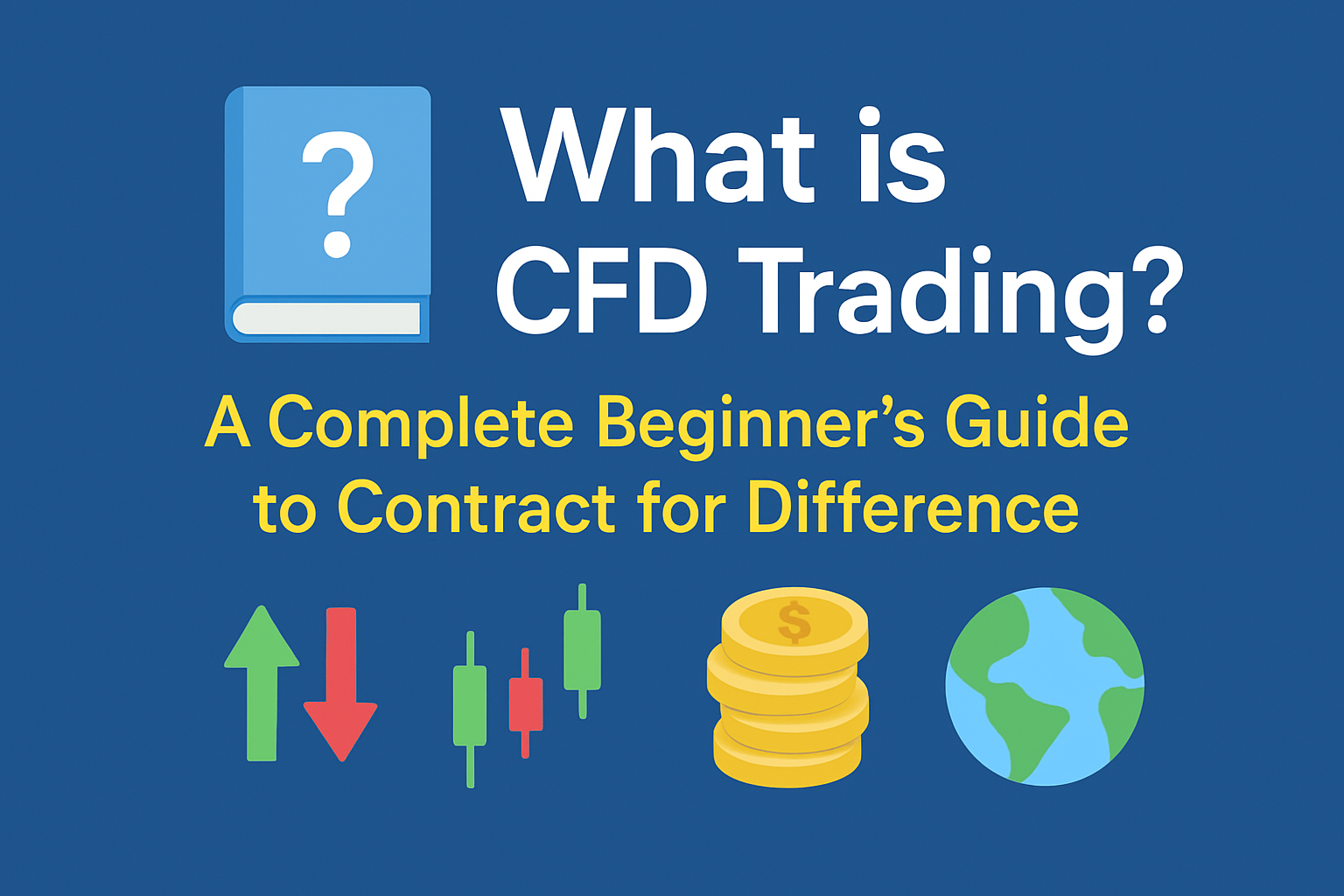📘 What is CFD Trading? A Complete Beginner’s Guide to Contract for Difference
Are you new to the world of trading and hearing terms like CFD, forex, or leverage for the first time? Don’t worry — you’re in the right place! In this article, we’ll break down everything you need to know about CFD trading in simple, beginner-friendly language. 🚀
💡 First Things First: What is Trading?
Trading is the act of buying and selling financial assets — such as currencies, commodities, stocks, or cryptocurrencies — with the goal of making a profit from price movements.
For example, if you buy gold at $1,900 and sell it when it reaches $1,950, you’ve made a $50 profit. Sounds simple, right? But modern trading doesn’t always mean physically owning the asset. That’s where CFDs come in.
🔍 So, What Exactly is a CFD?
CFD stands for Contract for Difference. It’s a financial agreement between a trader and a broker to exchange the difference in the price of an asset between the time the trade is opened and when it’s closed.
With CFDs, you’re not buying the actual asset (like gold, Bitcoin, or a stock). Instead, you’re simply speculating whether the price will go up or down. This gives you flexibility, speed, and access to a wide range of markets. 🧭
📌 Example:
- You believe Tesla stock will rise.
- You open a CFD “Buy” position at $700.
- If the price rises to $750, you earn the $50 difference — without owning any Tesla shares.
⚙️ How Does CFD Trading Work?
CFD trading is all about predicting price movements. You can choose to:
- 📈 Go Long: If you expect the price to go up (Buy)
- 📉 Go Short: If you expect the price to go down (Sell)
When the market moves in your favor, you profit. If it moves against you, you lose.
📊 What Can You Trade With CFDs?
CFDs are available on a wide range of financial instruments. Here’s a quick overview:
| Asset Class | Examples |
|---|---|
| 💱 Forex (Currency Pairs) | EUR/USD, GBP/JPY, USD/JPY |
| 💹 Stock Indices | NASDAQ, S&P 500, Dow Jones |
| 🏭 Commodities | Gold, Oil, Silver, Natural Gas |
| 📉 Shares (Stocks) | Apple, Tesla, Google, Amazon |
| 🪙 Cryptocurrencies | Bitcoin, Ethereum, XRP, Litecoin |
✅ Key Benefits of CFD Trading
- Leverage: Trade larger positions with a small deposit (but watch your risk!) ⚠️
- Two-Way Trading: Make money in both rising and falling markets 🔁
- Diversified Access: Trade across multiple markets from one platform 🌐
- No Ownership Needed: No need to physically own or store assets like gold or Bitcoin
- Fast Execution: Open and close trades in seconds ⏱️
⚠️ Risks You Should Know About
CFDs can be powerful tools — but they come with significant risks, especially for beginners:
- ❗ High Leverage = High Risk: Small market movements can lead to big losses
- ❗ Fast-Paced: Prices can change rapidly; emotions can take over
- ❗ Requires Knowledge: Lack of strategy or education can be dangerous
- ❗ Overtrading: Easy access can tempt you into excessive, impulsive trades
👣 How to Start Trading CFDs (Step-by-Step)
Ready to begin your trading journey? Here’s a beginner-friendly roadmap:
- 📌 Choose a regulated and trustworthy CFD broker (like FP Markets, Exness, etc.)
- 🧪 Open a demo account and practice with virtual funds
- 📚 Learn basic technical analysis and market structure
- 🎯 Develop a simple trading strategy with risk management
- 💼 Switch to a live account and start with small capital
📌 Smart Tips for Beginner CFD Traders
- 🧠 Always use Stop Loss and Take Profit to control risk
- 📊 Don’t rely on luck — learn to read charts and patterns
- 📉 Start small, scale up slowly
- 📈 Keep a trading journal to review your decisions
- 📚 Keep learning — follow educational content and stay updated
🧠 Final Thoughts: Is CFD Trading Right for You?
CFD trading is a flexible and powerful way to participate in global financial markets. It allows beginners to start small and access markets like forex, crypto, and stocks without owning the actual assets.
However, with great potential comes great responsibility. Proper education, practice, and discipline are the keys to surviving — and thriving — as a CFD trader.
👉 If you’re serious about learning, take your time, stay focused, and never risk more than you can afford to lose.
🚀 Learn. Practice. Grow. The world of CFD trading is waiting for you! 🌍
